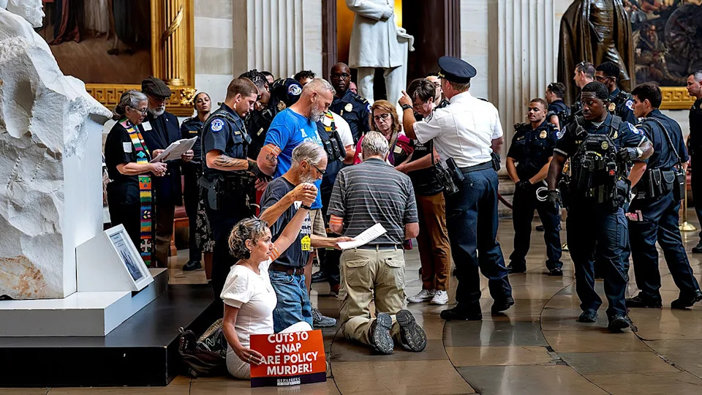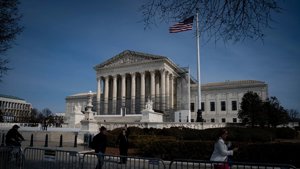
Protesters Arrested at Capitol Over GOP Tax, Spending Cuts
Capitol Police arrest demonstrators opposing GOP tax and spending cuts, as protests erupt over SNAP and Medicaid reductions.
Demonstrators Arrested Amid Senate Debate on Trump-Backed Bill
Dozens of demonstrators were arrested by U.S. Capitol Police inside the Capitol Rotunda and at a nearby intersection in Washington, D.C., as protests erupted against Republican legislation proposing tax and spending cuts. The protests coincided with ongoing Senate debate over President Donald Trump’s sweeping “big, beautiful bill,” which aims to reshape federal tax and spending priorities.
Protesters carried signs and black wooden coffins to symbolize the real-life impact of the proposed cuts. Some signs warned that “cuts to SNAP are policy murder,” while others listed projected losses to Medicaid and nutrition benefits in states like Florida, West Virginia, Illinois, and Kentucky. Several demonstrators wore religious attire, emphasizing the moral dimensions of the debate.
U.S. Capitol Police reported that those arrested face charges including crowding, obstructing, and incommoding. The protests occurred at two sites: the Capitol Rotunda and an intersection near the U.S. Capitol Building. Images from inside the rotunda showed demonstrators with signs and t-shirts marked with messages from the Poor People’s Campaign, a group known for organizing nonviolent actions targeting social and economic injustice.
Activists Rally Against Cuts to Social Programs
Among the groups involved was Repairers of the Breach, which described the protest as part of a tradition of nonviolent resistance at the Capitol. The organization’s statement called for confronting what it views as unjust policies and “calling the nation to higher ground.” Demonstrators argued that cuts to programs like SNAP (Supplemental Nutrition Assistance Program) and Medicaid would have dire consequences for vulnerable Americans.
The protests came as Republican lawmakers pressed to meet a July 4 deadline to pass the massive budget reconciliation bill, a centerpiece of Trump’s legislative agenda. If passed, the bill would advance changes on taxes, immigration, energy, defense, and national debt policy. The legislation is currently being debated in the Senate, where opposition and public protests underscore the contentious atmosphere surrounding its provisions.
As lawmakers work toward a final vote, the arrests and visible activism at the Capitol highlight the stakes for millions of Americans who rely on federal assistance programs. The outcome of the bill will shape not only the future of the nation’s fiscal policy but also the safety net for the most vulnerable, setting the stage for further political debate and civic engagement as the July 4 deadline approaches.






